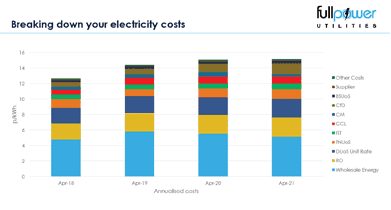
If you have taken on your first commercial property, or you have just converted your family home into a luxury B&B, your energy bills are going to soar beyond your control. Bill Lumley talks to energy brokers to see how you can keep costs down.
You only have limited control over the gulf in energy costs between running your own family home and operating a commercial hospitality business. Even if you leave courtesy notes around the rooms asking your guests to consider the environment, there is nothing to stop them sleeping with the window open while the heating is on high, taking lengthy hot showers, or even simply leaving lights on. The cumulative costs can be astronomical.
You may not be aware that there is one money-saving step you may consider taking that could significantly reduce your energy bills, and that is to appoint an energy broker, whose function is to find you the cheapest supplier in as deregulated market.
Full Power Utilities has a large client base of UK independent hospitality businesses. UK channel manager Marc Wheatley says the service his company provides minimises what clients pay for their gas, electricity and water supply.
“We also remove the headache of trying to navigate a confusing marketplace, and we address the headache of dealing with the energy suppliers whenever there is a problem,” he says. “If a client has received an incorrect bill – and this unfortunately happens an awful lot – then, rather than having to call the energy supplier, they call us. Our direct links into the suppliers mean we can get things sorted out a lot more quickly.”
The lack of knowledge of the existence and function of energy brokers is astounding, he says, particularly among smaller businesses like independent guest houses and hotels, which simply renew their contract with their existing energy supplier year on year.
Conserving energy at peak times
There are two factors when it comes to saving power. The first is that it is important to minimise consumption where they have control such as communal areas. “In any B&B, guest house or hotel, the breakfast room and kitchen are where a vast amount of your energy is consumed,” he says. “The second factor is to make sure you are paying as little as possible for the gas, electricity and water that you actually consume.”
Reducing consumption can be as simple as changing your halogen lightbulbs to LED bulbs, he says. “I hope that all business owners are aware that making that minor change can make a huge difference. If you want to go a step further you can get building management systems installed, for instance lights that work on sensors and go out if they detect no movement over a fixed period.”
Market agreements
The function of an energy consultancy is to understand the requirements of the hospitality business, to go to the market and negotiate deals with all the current energy suppliers. Full Power has agreements with 48 suppliers. “Most people will be aware of the big six: British Gas, E.ON UK, npower, EDF Energy, Scottish Power and SSE, but they probably aren’t going to be aware of the 50 or so other suppliers out there in the market,” says Marc.
Around one in five of the suppliers in the commercial market will not deal directly with the end user, instead dealing exclusively with brokers. “If a luxury B&B operator approached Positive Energy, a major supplier in the UK market supplier, asking for a quote for your business, they won’t provide one,” he says.
It is these suppliers that tend to be the most competitive: having fewer overheads, and without having to invest in a sales team, they can pass on better rates to the end user. “There is an immediate benefit to using a broker,” he stresses.
Selecting the right contract
Choosing the right energy supplier and the right contract is similar to choosing the right insurance policy. “Many people do not know whether their policies actually cover certain risks to which they may be exposed for a multitude of reasons and the policy may not meet the business owner’s requirements. Energy is not too dissimilar.”
Gas and electricity differ in their complexity, he says. “Gas is quite a simple product, not complicated and quite easy to understand. By contrast electricity is increasingly becoming confusing, owing to the variety of power source and more business owners are becoming more aware of their carbon footprints, and more and more are demanding newer and renewable green energy.”
Electricity is confusing not just in the way it is produced and sourced, but also in the way it is priced. Within a commercial electricity rate there are the actual costs of the electricity, then there are more than 10 different taxes and levies and charges that make up the price of the electricity supply. At present more than 55% of the price is made up of non-commodity charges. These include the feeding tariff, the climate change levy, renewable obligation and others, all in place to penalise commercial operations for consuming large quantities of electricity.
Maintaining the national grid
In addition, there are charges for the maintenance of the ageing structure of the national grid, built many years ago. “It’s a bit of a patchwork quilt and the demand on the grid is more than it has ever been, and it is struggling under the pressure,” he says. “The price we pay for electricity includes a lot of charges to support the national grid.”
Referring back to the insurance metaphor when you take out a policy you need to know it covers you for everything you need. When you take out an electricity contract you need to know the price you are paying includes all these charges and you are not susceptible to price increases, should the price go up during the course of the contract. “You need to know the contract you have is what we call a fully fixed product. Broker will help business navigate this and ensure they are covered for all eventualities,” says Marc.
Water supplier issues
Water supply is less complex than electricity or gas. The UK water market is separated into four areas: Northern Ireland, England, Wales and Scotland. Unlike Scotland and Northern Ireland, the commercial water market was only deregulated in England and Wales in April 2017. Prior to that business owners had to purchase their water supply from their local water authority. Now they can shop the market and buy water from the supplier of their choice.
In truth there are minimal savings to be had by shopping around for a water supplier, Marc says. However, if you are a multi-site hospitality business owner with perhaps six different guest houses or hotels dotted around the UK, you will be able to choose from the water supply of up to six different water companies. Under the relatively recently deregulated market you can now put all of your properties’ water supply under one company, you will get one bill and you will probably save some money as well as the inconvenience of dealing with up to six different companies. There is thus an opportunity to tidy up your business water requirements.

Taking over new property
If you are taking on a new property, locate the gas water and electricity meters, and find out who the supplier is. If your own the property already and are converting it into commercial use, then you should be looking for a commercial supply of your gas and electricity. “You may not be able to change your water supply as the water authority may see it as a domestic supply. But to help you get one for gas and electricity there is no harm approaching as consultancy broker who should offer you a free review and not charge to review your current situation,” Marc says.
There are three revenue structures in the industry for companies of this nature. One is that a consultancy may charge a flat fee. The second is they may charge you a percentage of the savings they find you. The third structure is they won’t charge either a fee or a percentage of savings but will receive a commission from the supplier in question.
“In our opinion all our competitors should only be employing the third model, which is never to charge the client a fee, because they don’t need to,” he says.
When to lock in for a client
Most innkeepers and B&B owners are unlikely to pay close attention to the changes in the cost of energy measured in kiolowatts per hour. Laura Haapanen head of market strategy at Pulse Business Energy and Water makes market suggestions to her clients as and when to lock in a contract price. “I think this is one of the most important roles of an energy broker,” she says. “Typically, if you simply go directly with the supplier, they make more money if you sign up at a higher rate. It’s not in your best interest to make good market suggestions because if you sign up at 13p per kilowatt and the rate comes down to 11p, they pocket that money.
“When we give market recommendations as a broker, they are not influenced by us making any more or less money.”
“Many people think that simply locking in your energy is like signing a new cell phone contract and they are always looking for the lowest price. So, people give their contracts to six different brokers and their different suppliers directly in an effort to find the lowest price. What I usually tell people is to get their broker to view the market in line with what they are thinking.”
The point of a broker is more about managing your contract five or 10 years down the road not just giving you the price, she says. “If you are looking to buy on the last week before your contract ends and you want the lowest price that day go directly to the supplier and they will give you the lowest price that day and they will be very minimal difference in cost, but if you want the best price over the term of the contract two, three, five or even 10 years down the road then definitely use a broker. They are going to make the right suggestions.
“It’s not that suppliers can’t make the best suggestions in terms of contract term life, but they will want to sign you up as long as they can: you can’t really trust what they are saying. They’re in business too – that’s what they do.”
Making the right call on how klong to be roped into an energy contract at a fixed price depends on looking at the time and points of recent highs and lows. It is easy to believe it is a good idea to be tied into a contract for a number of years, especially if the rate is favourable compared with the previous year which may have seen energy prices distorted as happened after the Beats from the East last year.
She says: “we get the lowest price. When you are looking for contracts and use bidding practices really what we are trying to do is devise strategies for our clients and put parameters in to make sure they are not making the wrong decision for example going too long at the wrong time and even going short at the wrong times.
She says when making a decision as to your energy contract you shouldn’t simply look at your budget from last year and the rate you are currently paying, but instead you should look at the whole historical picture. “When you are looking at a price and it says £50 per mega watt hour the downside risk is at this stage far greater than the upside return. In other words, the market is far more likely to come down at this point than it is to go up. Therefore, we are advising our clients right now to hold off locking into a contract as there is no reason to believe the market will fall to £44 per megawatt hour which was the 2017 high. We are surprised by the number of people who seem happy to sign 48-month contracts,” she adds.
Choosing the right broker
An independent hospitality business owner needs to find a broker he or she can trust over the long term, she says. “Someone you approach for advice might show you where the market is now and show you a five-year view and a one-year view. If someone right now suggests you go for 36 or 48 months, they either don’t grasp the market or its fundamentals, or they have a financial interest in signing up long-term contracts, as a lot of them are paid by term life.
“I suggest hospitality business owners test them, for example saying to the broker, ‘I am thinking of going 48 months.’ If the broker comes back and says they think the market is going to come down and that you should re-evaluate it and maybe think about 12 months, that is someone you want to think about working with long term.”
Best practice for commercial hospitality owners:
- Ensure that you have a fixed-price contract in place for the supply of your gas/electricity – ‘out of contract’ rates are upwards of 20% more expensive.
- Do not accept the renewal rates your existing supplier offers you – challenge them!
- Tender your gas/electricity supply with as many suppliers as possible – do not simply renew with your existing supplier.
- Save yourself time and gain access to more suppliers and better rates, by using an energy consultancy like Full Power Utilities.
- Chose an energy consultancy that does not charge you a direct consultation fee – they should offer you a free review.
- Use an energy consultancy like Full Power Utilities, that is ‘Code of Practice Approved’.
Source: Full Power Utilities





